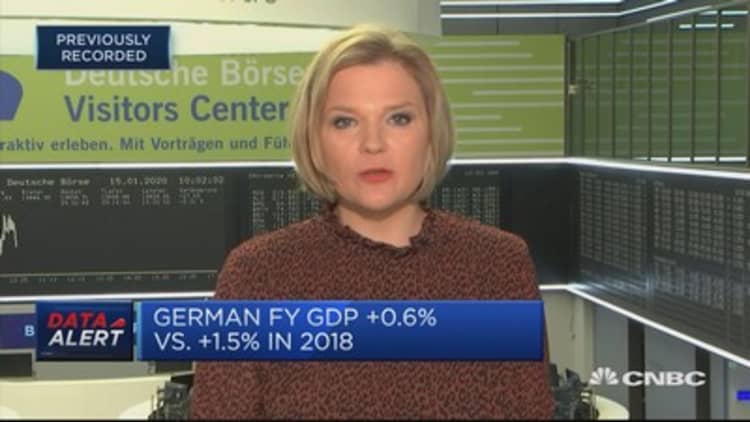Editors note: Germany is the country that is breaking up Europe because of its trade surplus and sucking the economic life out of the peripheral countries.
Germany accounts for nearly one-third of the euro area economy, and its bilateral goods trade with Europe and the U.S. represented last year 1.8 trillion euro ($2 trillion).
[Dr. Michael Ivanovitch | February 16, 2020 | CNBC]
The German trade, therefore, has a substantial impact on those two highly open economic systems making up two-thirds of the world’s industrialized economies.
Sadly, instead of acting as a constructive member of the international community, Germany is running its own economy into the ground by allowing demand and output to stagnate for most of last year – and just barely managing to eke out a 0.6% growth rate.
During that time, Germany continued to live off its trade partners, while lecturing all comers on economic policy, virulently denouncing the support provided by the euro area’s easy credit conditions and relentlessly attacking Washington’s allegedly nationalist agenda. All that because the United States’ long-overdue decision to cut its excessive trade imbalances runs counter to Germany’s mercantilism.
Some chutzpah indeed from a beggar-thy-neighbor country with a virtually dead economy, a nearly 2% of GDP budget surplus and by far the world’s largest trade surplus of $290 billion — a textbook case of an economy that should vigorously expand its demand management policy.
Germany’s systematic failure to do that has drawn a devastating market verdict.

Over the last five years, the return on Germany’s DAX (in dollar terms) has been a puny 3.7% per year, compared with the stellar 13% on the Dow Jones Industrial Average. And there is worse: Over that interval, some of the flagship German manufacturing brands have lost more than half of their share values.
No wonder that Germans continue to shift the blame onto the European Central Bank for “robbing” savers with low and negative interest rates.
Germany is in an intractable governance chaos, but that should not be the reason for not calling Berlin out on its selfish and un-European economic policies.
Washington is a particular puzzle in that respect, with its apparent lack of concern while Germany continues to kill a European market that takes one-fourth of American exports. Berlin also plays a key role in dictating the EU’s outrageously discriminatory treatment of U.S. automobiles and farm products, among other things.
The upshot is that U.S. goods exports to Germany last year were less than a half of German sales to the U.S. Partly as a result of that, U.S. sales to the EU were more than one-third lower than what Europeans kept unloading on U.S. markets.
And Washington is still taking the German catcalls about self-centered nationalism?
The sad part is that neither the U.S. nor Germany’s key European partners (France, Italy and Spain) seem determined to change Berlin’s economic policies.
The point of that change would simply be to (a) generate most of German economic growth from domestic demand, (b) diversify destinations of export sales, (c) substitute exports through local production and (d) encourage sound pro-growth policies in EU countries suffering from poverty, high unemployment and lagging economic development.
In fact, such a change of German economic policies would also have the merit of introspection.
Berlin, for example, is now confronting the painful truth that the economic mismanagement of its eastern states created the breeding ground of social discontent, political extremism and sectarian violence.
Mindless immigration policies in 2015 only added oil to fire by feeding and spreading xenophobia as one of the most intractable socio-political issues that is now being dealt with by the EU and Germany’s highest judicial authorities.
A pro-European German policy could have been helpful. What if, for example, Germany offered at that time its job vacancies to some of those 17 million fellow European job seekers? And, in retrospect, was it wise for Germany in 2007 to shoot down the French idea of the “Union of the Mediterranean” to manage problems of North Africa – Europe’s proverbial “soft underbelly?”
France had in mind actions of economic development to forestall massive migrations of desperately poor people looking for survival. But, then as now, what happened is reminiscent of German obstruction and mismanagement with tragic consequences.
Washington can – and emphatically should – help for the sake of the viable trans-Atlantic community and a defense of the Western world order.
Secretary of State Mike Pompeo’s shouting match with Germans last Saturday at the Munich Security Conference shows that the U.S. has a serious European crisis on its hands.
Commentary by Michael Ivanovitch, an independent analyst focusing on world economy, geopolitics and investment strategy. He served as a senior economist at the OECD in Paris, international economist at the Federal Reserve Bank of New York, and taught economics at Columbia Business School.
Read the original article here.













